
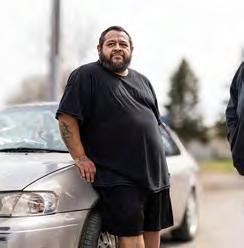
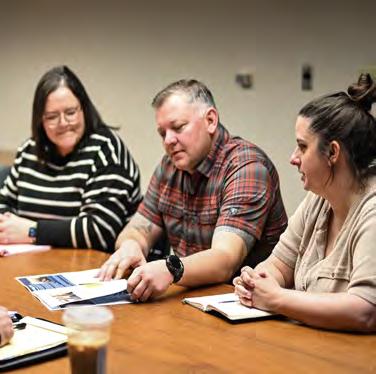
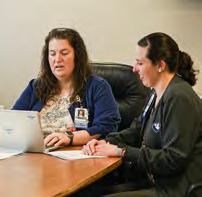























A
2024 has been a year of remarkable growth, collaboration, and impact for the Caring for Our Communities (CFOC) initiative. As we reflect on this past year, we celebrate the unwavering commitment of our partners, funders, and supporters who have joined forces to break down barriers to care and create meaningful, lasting change.
This year, we expanded our reach throughout Pottawattamie and Mills Counties, supporting 3,689 active clients, including 1,400 new individuals seeking essential services for the first time. Through our growing network of dedicated stakeholders, we have strengthened the health and well-being of our community—proving that when we work together, we can transform lives.
Thanks to the generosity of our philanthropic donors, 100% of every dollar contributed has fueled our voucher program, ensuring access to healthcare, transportation, nourishing food, and vital medications. Additionally, these funds have empowered our CFOC Community Health Coaches, who provide personalized support to individuals navigating complex health and social challenges.
As you explore this report, you will witness the incredible impact of your support—real stories of resilience, partnerships that drive progress, and a shared commitment to strengthening our community. CFOC is not just a program; it is a movement fueled by people like you who believe in a healthier, more equitable future for all. We welcome your involvement. To learn how you can contribute or support our mission through a financial donation, please reach out to me at tara.slevin@nmhs.org or CFOC@nmhs.org.
Thank you for standing with us. It is an honor to serve alongside such dedicated leaders, partners, and community champions as we continue working toward a healthier, stronger future together.
With gratitude,

Chief Philanthropy Officer President, Jennie Edmundson Foundation
How Methodist Jennie Edmundson Hospital has Strengthened Caring for Our Communities
For the past ten years, Methodist Jennie Edmundson Hospital (MJE) has been a driving force behind Caring for Our Communities (CFOC), transforming how healthcare, social services, and community partnerships intersect to support those in need. Led by the Jennie Edmundson Foundation, CFOC bridges healthcare with essential social supports, ensuring patients receive care beyond medical treatment.
While CFOC’s success is built on collaboration with external partners, the leadership, financial support, and vision of MJE and the Jennie Edmundson Foundation Board of Directors have been equally critical. Their commitment has allowed the program to expand beyond hospital walls. Looking ahead, the hospital and foundation have further elevated their support for CFOC in their 2025-2028 strategic priorities, ensuring the program continues to grow and adapt to the community’s needs.
Expanding Access to Care
CFOC was founded on the belief that healthcare extends beyond the bedside—meeting people where they are: homes, shelters, encampments, or community spaces. MJE's leadership recognized early on that true change required a model integrating healthcare with housing support, food security, transportation assistance, and behavioral health services.
This approach wouldn’t be possible without the hospital’s commitment—not only in financial investment but also in fostering collaboration. From embedding Community Health Workers in clinical settings to strengthening partnerships with care coordinators and social workers, MJE's leadership has championed a model that prioritizes people over processes.
"We recognize that addressing social determinants of health is essential to delivering high-quality care. CFOC and the creation of our Community Health Department represents our commitment to ensuring patients have the support they need beyond hospital walls." – David Burd, President & CEO, Methodist Jennie Edmundson Hospital
Strengthening Impact Through Innovation
CFOC has refined its approach to provide timely, individualized support. By leveraging data-driven insights and integrating technology into service delivery, CFOC has streamlined patient referrals, improved care coordination, and enhanced its ability to address barriers before they become crises. This approach ensures individuals receive the right support at the right time, maximizing impact and long-term stability.
"CFOC has never wavered in its commitment. Every challenge has reinforced our dedication to innovation and
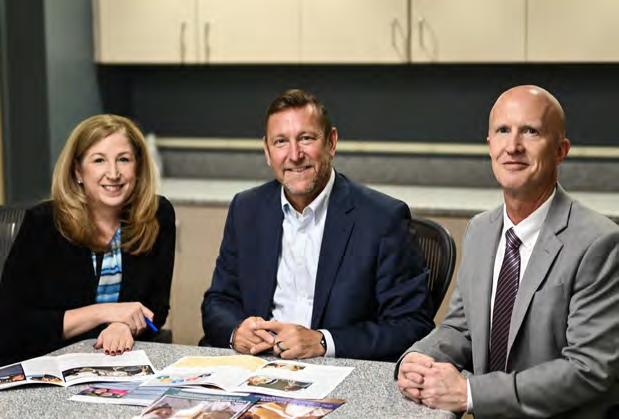
R)
plan initiatives for the Foundation Board and Foundation.
collaboration, ensuring individuals receive meaningful, life-changing support. From meeting people in our emergency rooms to expanding partnerships with Nebraska Methodist College, Methodist Physicians Clinic, and Emergency Management Services, to normalize a Street Medicine Program in late 2025, we are building bridges to care in every corner of our community." – Tara Slevin, President, Jennie Edmundson Foundation
A Lasting Commitment to Community Well-Being
Looking ahead, MJE's leadership and the Jennie Edmundson Foundation continues to envision a future where no patient or community member is left behind due to social or economic barriers. The generosity of individual donors, corporate sponsors, and philanthropic partners has been instrumental in ensuring CFOC’s sustainability and helping the program reach more individuals.
"The Board of Directors has long recognized that true healthcare goes beyond treatment—it is about ensuring individuals and families have the resources they need to thrive. Our continued support of CFOC is a testament to our belief in creating a healthier and stronger community for all." – Scott Hartman, Chairman, Jennie Edmundson Foundation Board of Directors
CFOC’s impact is made possible through the dedication of those who believe in a healthier, more connected future. Our commitment remains at the heart of building a stronger, more equitable future for all.
Led by Sandy Green, Rachel Reis, and Tara Slevin, CFOC have developed a sustainable framework that reaches our most vulnerable. Those experiencing homelessness, serious illness, or financial instability—and what we’ve come to call the “vulnerable middle”: seniors with limited mobility, working families managing chronic conditions, and individuals living paycheck to paycheck who are one crisis away from losing their footing.
“We often think of ‘at-risk’ individuals as only those who are unhoused or in extreme poverty,” says Sandy Green. “But the reality is that many families are just one unexpected bill, job loss, or health event away from falling into crisis.”
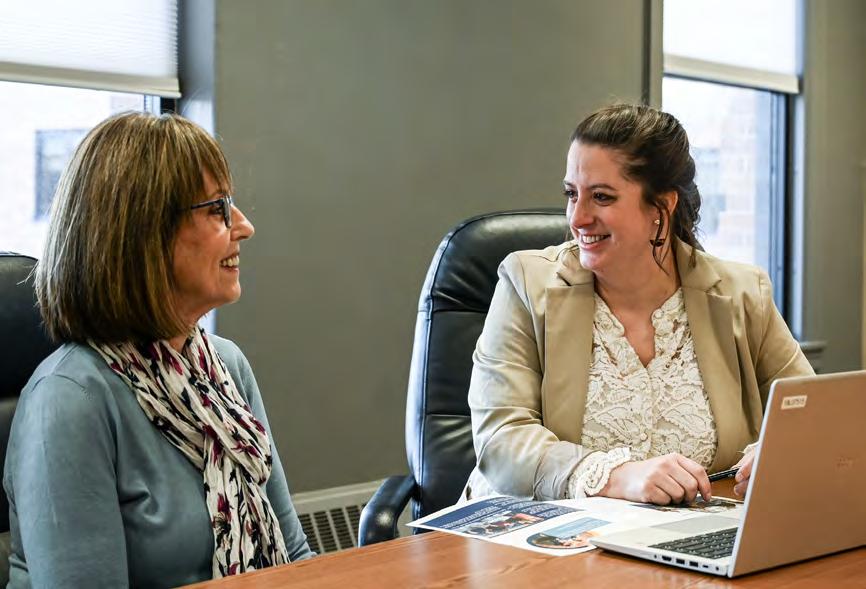
At its core, CFOC is about delivering care beyond the clinical setting. By bringing together healthcare providers, social workers, first responders, and local organizations, the initiative removes barriers to care and builds pathways toward long-term wellness. Whether it’s helping a recently discharged patient return home with groceries, coordinating transportation to a follow-up appointment, or connecting someone to behavioral health services, CFOC focuses on real-world solutions that help people move forward.
Rachel Reis, who also leads the hospital’s Social Determinants of Health (SDOH) efforts, emphasizes the importance of community-based strategies. “Many of the individuals we support are managing multiple chronic conditions, mental health needs, and economic insecurity all at once,” she explains. “To make a lasting difference, we need to address what’s happening outside the hospital—where people live, work, and age.”
A cornerstone of CFOC’s success lies in its team of five Community Health Coaches: two coaches embedded
within MJE hospital and Connections Area Agecy on Aging, two First Responder Coaches working alongside police, fire, and public health teams in Pottawattamie and Mills Counties, and an RN Community Health Care Manager covering evening hours in the emergency department. These coaches serve as trusted guides, reaching individuals in homes, shelters, hospital rooms, and street-level encampments.

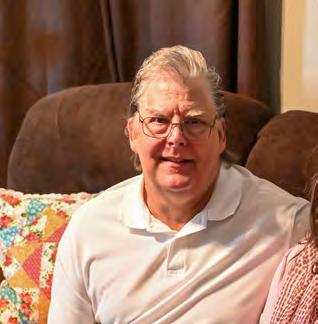

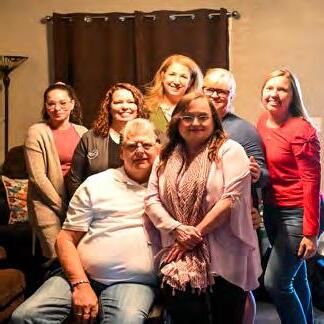
For years, Jon and his partner, Wanda, faced an uphill battle navigating a system that often left them without the care they desperately needed. At just 61, Jon endured life-altering health challenges—a stroke, pulmonary embolisms, and brain surgery—only to later be diagnosed with inclusion body myositis (IBM), a progressive muscle disease. His condition left him with increasing muscle weakness, making even basic daily activities a challenge.
Through it all, Wanda remained his unwavering caregiver, taking on the physical, emotional, and financial burdens of Jon’s care. Despite countless attempts, Medicaid denied Jon in-home support simply because he was under 65, leaving the couple stuck in a constant cycle of waiting, hoping, and struggling.
Then, in early 2024, Jon landed in the emergency room at Methodist Jennie Edmundson Hospital after another serious fall. That’s when he was referred to Jeanna Bull, a Community Health Coach embedded through our partnership with Connections Area on Aging. Jeanna stepped in immediately, determined to find real solutions.
Jeanna worked tirelessly to cut through the red tape that had kept Jon and Wanda from getting help. She secured a Medicaid in-home care waiver, set to begin in December 2024, ensuring Jon would receive home modifications, durable medical equipment, and caregiver assistance. Most importantly, Wanda was approved as a paid caregiver, providing financial relief and long-term stability.
In addition to medical advocacy, Jeanna and the CFOC team connected the couple with a wide range of life-changing resources:
•Navigating Medicaid & Home-Based Supports: Jeanna worked through multiple applications and assessments to ensure Jon’s placement on the waiver list and continued support.
•Financial advocacy helped lower their car insurance, reduce medical costs, secure energy assistance, and keep their mortgage on track.
•Essential home modifications—including a slide board, grab bars, and a wheelchair ramp—helped Jon regain some independence.
•Meals on Wheels delivered nutritious meals, easing Wanda’s burden and ensuring Jon’s dietary needs were met.
•The Connections Family Caregiver Program provided respite support in preparation for Jon’s night out, allowing Wanda to take a break before joining him for the special experience.
Through Jeanna’s work with the Dreamweaver Foundation, Jon was granted a heartfelt wish—one that reminded him and Wanda of life beyond caregiving.
On a crisp evening in November, a crowd of supporters from CFOC, Connections, Dreamweaver Foundation, and the Jennie Edmundson Foundation gathered

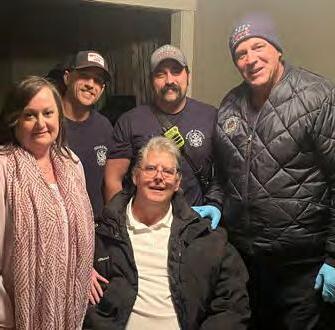

“CFOC is like a bulldozer, breaking down the barriers that kept us from getting help. We’re not alone anymore.”
- Jon
outside their home to cheer them on. A sleek limousine from Shamrock Limousine whisked Jon and Wanda away for a luxurious dinner at 801 Chophouse in Omaha, followed by an unforgettable night at Jelly Roll’s, "Beautifully Broken" concert.
For a few hours, Jon and Wanda weren’t caregiver and patient. They were simply a couple, enjoying music, laughter, and a night free of worry.
The magic of the evening continued beyond that one night. Through Dreamweaver’s partnerships, Jon was also gifted an adapted guitar and lessons, fulfilling his lifelong passion for music despite his physical limitations.
When Jon and Wanda returned home, the final act of community support was waiting. The wheelchair ramp at their home was not yet installed, making it difficult for Jon to get inside on his own. But a team of dedicated firefighters was ready to assist. With care and precision, they helped Jon back into his home safely—proving once again that this community shows up for one another. The ramp coordinated by Connections Area on Aging, was placed in the spring of 2025.
The Power of Collaboration
Jon’s story is proof of what’s possible when organizations unite—and of the incredible resilience shown by people like Jon and Wanda. The coordinated efforts of CFOC, Connections Area on Aging, Jennie Edmundson Foundation, the Dreamweaver Foundation, Council Bluffs Fire Department, and other local partners ensured that
Jon and Wanda didn’t have to navigate these challenges alone.
And at the heart of it all was Jeanna Bull, whose nearly ten years of service as a Community Health Coach has made stories like Jon’s possible.
Jon summed it up best: “CFOC is like a bulldozer, breaking down the barriers that kept us from getting help. We’re not alone anymore.”
Thanks to collaborative efforts, Jon and Wanda now have financial stability, home-based support, and renewed hope for the future.
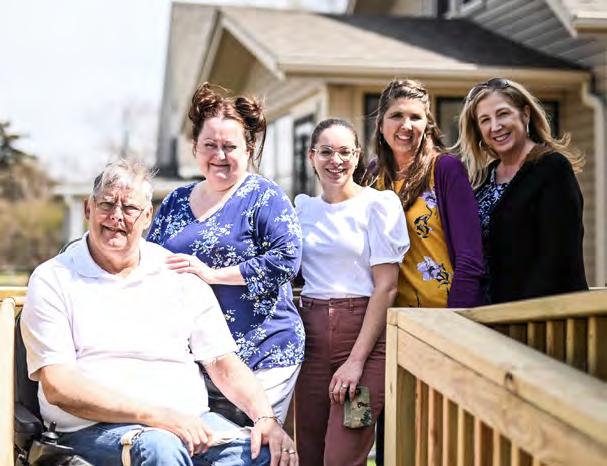

New Visions Homeless Services, Chief Operation Officer Shawn Miller, meets clients outside of their facility. Shawn recognizes it takes a community effort to make a larger impact. The generosity grows exponentially when organizations can work together.
Whether facing record-breaking winter storms, blistering summer heat, or sudden downpours and floods, our community’s most vulnerable residents— those experiencing homelessness—are on the front lines of risk. But in Council Bluffs, when extreme weather strikes, our street outreach teams don’t just show up— they step up.
New Visions Homeless Services, Heartland Family Services, the Council Bluffs Police Department’s Homeless Outreach Program (HOP), the Fire Department, Methodist Jennie Edmundson Hospital and a number of other partners—collaborate throughout the year to bring resources directly to those living on the streets, in encampments, or in unstable housing. From subzero cold to scorching summer days, these teams deliver lifesaving care, compassion, and supplies where they’re needed most.
While New Visions plays a leading role in year-round outreach, during the brutal winter of 2025, they expanded services by opening a Warming Day Shelter to provide safe refuge. From January 6 through March 28, the shelter served 255 individuals—130 men and
125 women. In just under three months, they provided 2,155 meals, distributed 1,155 health and hygiene kits, and handed out 315 pieces of winter clothing. Twenty-seven needs assessments led to meaningful outcomes: 10 individuals were discharged into stable housing, five reunited with family, and 10 were connected to emergency shelters.
"The cold doesn’t discriminate. When temperatures hit dangerous lows, we knew we had to act fast," said Shawn Miller, Chief Operating Officer of New Visions. "This wasn’t just about sheltering people—it was about saving lives. The partnerships and generosity we witnessed were nothing short of incredible."
Beyond the warming center, New Visions conducts daily street outreach, building trust with those who are hesitant to seek help. Alongside them, Heartland Family Services’ Peer Center provides a welcoming daytime refuge, offering warmth, meals, and links to services. Meanwhile, HOP, CFOC First Responder, and the Fire Department continue to identify individuals in need and deliver emergency aid wherever it’s needed.

While emergency outreach addresses immediate survival, another vital layer of care works behind the scenes to help individuals experiencing chronic homelessness find lasting stability. The Caring for Our Communities (CFOC) Homeless Review Team (HRT) is one such effort—a partnership committed to transforming lives through long-term, coordinated support.
Formed through collaboration between Methodist Jennie Edmundson Hospital, All Care, Council Bluffs Police and Fire Departments, New Visions Homeless Services, Heartland Family Services, the Southwest Iowa Mental Health and Disability Services Region, Threshold, and Anawim Housing, the HRT focuses on individuals who are repeatedly underserved by traditional systems.
Led by Rachel Reis, MJE Director of Community Health, and Chasity Kephart, First Responder Community Health Coach, the HRT works with approximately 15 individuals at a time, developing customized action plans that address housing, mental health, addiction recovery, and healthcare.
Each partner organization takes
ownership of key steps, ensuring no one falls through the cracks.
"For many we serve, homelessness isn’t just a housing issue—it’s the result of years of compounded challenges like mental illness, trauma, and substance use,” said Reis. “The HRT exists to offer stability, advocacy, and a path forward.”
In 2024, the HRT served 32 individuals. Half were successfully connected to long-term services and housing supports, including Integrated Health Homes, Certified Community Behavioral Health Clinics, Community Support Services, and Assertive Community Treatment programs.
The Homeless Review Team works one person at a time, ensuring that those experiencing chronic homelessness are not just offered temporary shelter—but connected to resources that build long-term stability:
•The Council Bluffs Police Department’s Homeless Outreach Program (HOP) and Fire Department provide emergency intervention and build trust between law enforcement,
EMS, and those experiencing homelessness.
•New Visions, Heartland Family Services, Anawim and Threshold engage individuals where they are— offering access to emergency shelter, long-term housing support, food, hygiene supplies, and substance use treatment.
•CFOC and Methodist Jennie Edmundson Hospital work alongside partners to reduce high emergency room utilization and connect individuals to behavioral health and case management services.
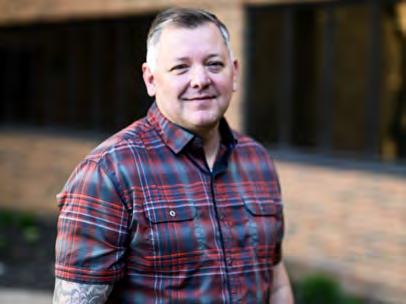
"This model works because we’re not working in silos,” said Chief Justin James, Council Bluffs Fire Department. “From the beginning, we knew we needed to collaborate differently. Embedding a community health coach in the first responder team has helped us bridge gaps in care, build trust, and work toward real outcomes for the people we serve.”
Aligned with the broader emergency outreach efforts described in A Community United, the HRT represents the next step: moving individuals from crisis to stability with compassion, consistency, and a strong web of support. It’s not just about a place to stay—it’s about building a path forward.
As the number of women experiencing homelessness continues to rise in Council Bluffs, local organizations have united to offer immediate, compassionate solutions.
One such effort—Women’s Day Wednesdays at New Visions Warming Shelter—provided a safe, welcoming space each week from January through March 2025. In just three months, the shelter served 110 unique women, with services provided by over eight partnering agencies.
These included New Visions, CFOC’s First Responder, Methodist Jennie Edmundson Hospital, Sanctuary House, Micah House, Hope-Net, and Catholic Charities. Each week, an average of nine women accessed case management, housing navigation, mental health support, peer counseling, and a hot meal.
What started as a short-term pilot quickly became a catalyst for broader collaboration. Agency representatives continue to meet, exploring options for a permanent, no-barrier women’s shelter. In the meantime, Shawn Miller, COO of New Visions, secured temporary space at

Firefly’s Lakin Campus to ensure the program can continue while a permanent location is identified. Want to help? Your donation to the CFOC Initiative will support ongoing operations—ensuring women in crisis continue to have access to warmth, safety, and vital support services.
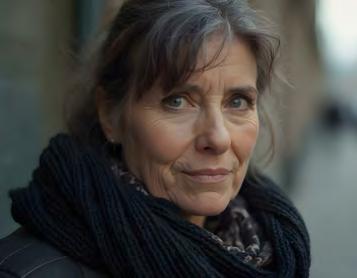
For years, Lydia*lived in a cycle of chronic homelessness. She bounced between shelters, spent time on the streets, and made frequent visits to the emergency room. Struggling with untreated mental health needs and the loss of her Social Security benefits, stability felt out of reach.
But in early 2024, things began to change. Lydia’s name was brought forward by First Responder Community Health Coach Chasity Kephart to the Caring for Our Communities Homeless Review Team (HRT). Week by week, the team problem-solved across systems, removing barriers that no one agency could have tackled alone.
Together, they helped Lydia reconnect with her benefits, access behavioral health care through Heartland Family Service, and coordinate a referral for Payee Services to help manage her finances. The Southwest Iowa Mental Health and Disability Services Region played a key role in helping clear a property-related barrier and supporting her connection to the Bridges program. When Anawim Housing offered her a unit, the team rallied to support the transition. Hope-Net helped furnish her new space through their thrift store, New Visions provided food support, and the Rapid Relief Team delivered additional essentials to help her settle in.
In April 2025, Lydia moved into her very own apartment—her first stable home in years. Her journey reminds us that complex challenges demand coordinated solutions. It took persistence, trust, and the strength of partnership, but today Lydia has more than a roof over her head—she has a second chance.

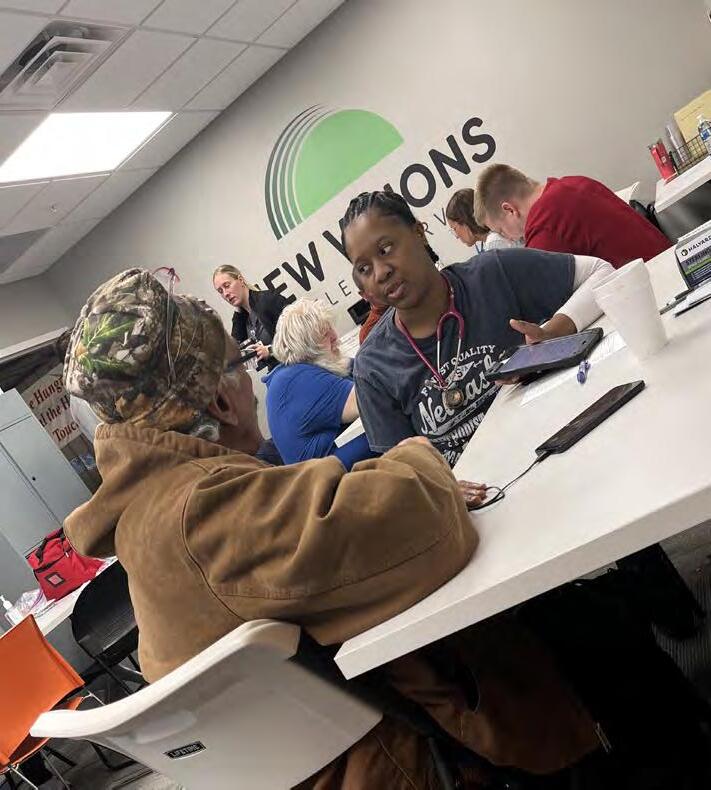
Through an innovative partnership between Nebraska Methodist College and Caring for Our Communities (CFOC), nursing and allied-health students are gaining hands-on experience while providing essential care to individuals in need. At least twice a month, nursing, respiratory, or occupational therapy students visit New Visions Joshua House to offer vital health services; including diabetes and hypertension screenings, respiratory care, mobility assistance, healthcare navigation and medication management.
This collaboration not only enhances healthcare access for some of the community’s most vulnerable populations but also prepares future nurses to address real-world challenges with compassion and skill. By working directly with individuals facing housing instability and complex medical conditions, students gain invaluable experience in providing patient-centered, traumainformed care outside of traditional clinical settings.
"This experience is invaluable for our students," said Alicia Whitehill, Director of Community Engagement at Nebraska Methodist College. "It gives them first-hand experience of providing trauma-informed care, prioritizing patient values, and healthcare navigation. They are seeing firsthand how significantly social determinants impact health outcomes. This will hopefully impact the care that they deliver everywhere. I’ve become increasingly passionate about street-level community health and am excited to join the CFOC Medical Committee to help start-up a Street Medicine Program. This is the future of compassionate, connected care."
By combining education with service, Nebraska Methodist College and our CFOC partners are working together to create a stronger, healthier community—one student and one patient at a time.
Rosa's Story
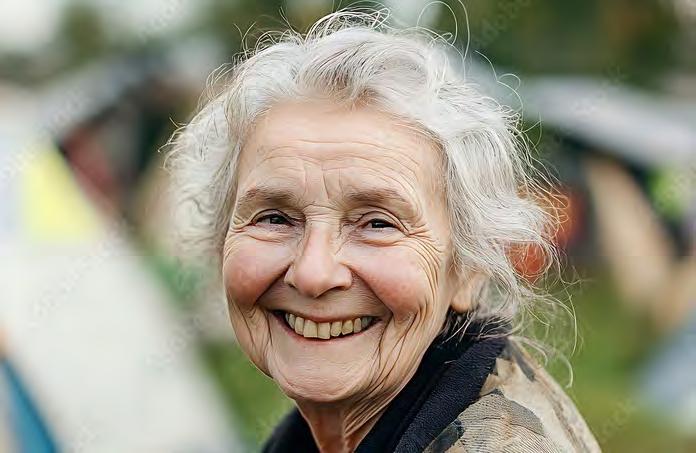
After a recent hospital stay for complications related to diabetes, Rosa*, a 73-year-old widow living alone, wasn’t sure how she’d manage her recovery. With no nearby family and limited mobility, even preparing a simple meal felt overwhelming.
That’s when a Methodist Jennie Edmundson social worker referred her to the CFOC Food Security Pilot. A hospital-based Community Health Coach helped Rosa order groceries online through Hy-Vee—selecting healthy foods tailored to her dietary needs.
Thanks to support from WoodmenLife and CFOC’s partnership with Connections Area Agency on Aging, a home health aide delivered the food directly to Rosa’s kitchen. She also enrolled in the Healthiest State Produce Prescription Program, receiving fresh fruits and vegetables to help manage her condition.
“I didn’t know help like this even existed,” Rosa shared. “For the first time in a long time, I feel like someone sees me.”
This simple intervention ensured Rosa had both the nutrition and support she needed to safely heal at home—and restored her sense of dignity along the way.
*Name and likeness changed to protect the identity of our cients.
The true success of the Caring for Our Community (CFOC) initiative lies in the powerful partnerships that have been forged along the way. These collaborations form the backbone of the initiative, bringing together a diverse network of organizations, healthcare providers, and community leaders, all united by a shared mission: to uplift and empower the most vulnerable among us.
Jennie Edmundson Foundation
Methodist Jennie Edmundson
All Care Center
Connections Area on Aging
Council Bluffs Fire Department
Council Bluffs Police Department
Methodist Physicians Clinic
Anawim Housing
Catholic Charities of Council Bluffs
Glenwood Police Department
Glenwood Fire Department
Heartland Family Services
Inter-Faith Response, Inc.
Micah House
CHI Mercy – Council Bluffs
Council Bluffs Public Library
Firefly
Hope-Net
Mills County Public Health
Nebraska Methodist College
New Visions Homeless Services
Pottawattamie County Public Health
Southwest Iowa Mental Health & Disability Services
Threshold Together
& Outreach
Anonymous
Community Foundations of Southwest Iowa
Iowa West Foundation
Jennie Edmundson Foundation
Keith Clan
Methodist Jennie Edmundson Hospital
Mutual of Omaha Foundation
WoodmenLife
“By coming together with a shared vision, we are breaking down silos and demonstrating that real change happens when we support one another—working hand in hand toward a healthier, more equitable future for all.”

Largest Population Served Ages 60-69


New Individuals Served in 2024
1,400

Number of Vouchers Distributed 1,375 Partnership Referrals Sent to MJE 899


Philanthropy fuels our initiative’s work to address immediate needs with compassion and connecting individuals to ongoing support. CFOC creates ripples of positive change throughout the community. It recognizes that health is more than just medical care—it’s about ensuring that every person can thrive.
Through the power of connection and care, CFOC is reshaping the future for those who need it most, proving that together, we can overcome barriers and create a brighter, healthier future for all. We welcome you to support this incredible mission.
Whether you choose to make a one-time contribution or commit to regular donations, you can have confidence that your generosity will directly impact our community.
To make a donation, scan the QR code or visit the Jennie Edmundson Foundation website at www.jehfoundation.org. To make a gift over the phone or to ask questions, please call 712-396-6040.
With you alongside us, we can make an even greater impact on those we serve, together.